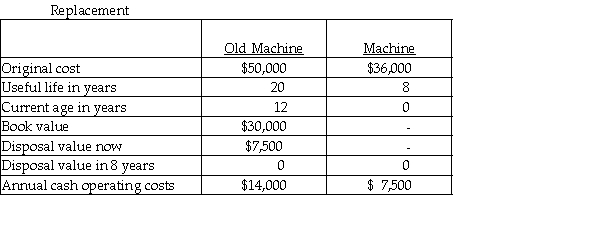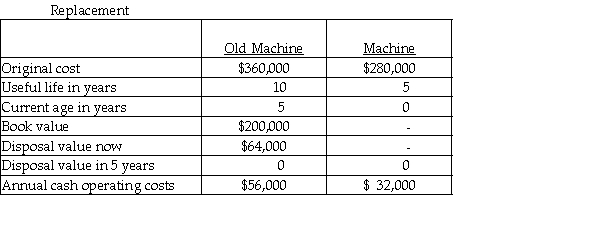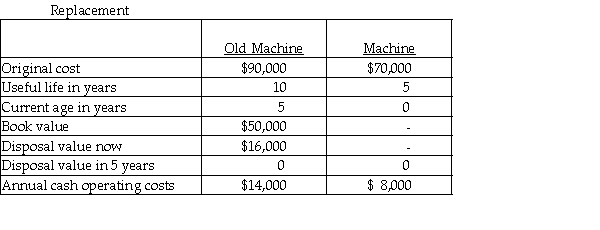Exam 9: Relevant Information and Decision Making: Production Decisions
Exam 1: Management Accounting and Management Decisions90 Questions
Exam 2: Cost Behaviour and Cost-Volume Relationships96 Questions
Exam 3: Measurement of Cost Behaviour97 Questions
Exam 4: Cost Management Systems134 Questions
Exam 5: Cost Allocation and Activity-Based Costing Systems128 Questions
Exam 6: Job-Costing Systems88 Questions
Exam 7: Process-Costing Systems82 Questions
Exam 8: Relevant Information and Decision Making: Marketing Decisions100 Questions
Exam 9: Relevant Information and Decision Making: Production Decisions111 Questions
Exam 10: Capital Budgeting Decisions116 Questions
Exam 11: The Master Budget112 Questions
Exam 12: Flexible Budgets and Variance Analysis106 Questions
Exam 13: Management Control Systems, the Balanced Scorecard, and Responsibility Accounting94 Questions
Exam 14: Management Control in Decentralized Organizations103 Questions
Select questions type
Mann Corporation has a joint process, which produces three products, A, B and C. Each product may be sold at split-off or processed further and then sold. Joint processing costs for a year amount to $125,000. Other relevant data are as follows:
 -Once product A is produced, processing it further will cause profits to
-Once product A is produced, processing it further will cause profits to
(Multiple Choice)
4.9/5  (37)
(37)
A relevant costing analysis that focuses on whether a product should be processed beyond the split-off point.
(Short Answer)
4.8/5  (36)
(36)
Pett Company produces a part that is used in the manufacture of one of its products. The costs associated with the production of 5,000 units of this part are as follows:
 Of the fixed factory overhead costs, $15,000 is avoidable.
-Assume that Pett can buy 5,000 units of the part from another producer for $21 each. The current facilities could be used to make 5,000 units of a product that has a contribution margin of $5 per unit. Fixed factory overhead costs to produce this new product would be exactly the same as for the currently produced part. Pett should
Of the fixed factory overhead costs, $15,000 is avoidable.
-Assume that Pett can buy 5,000 units of the part from another producer for $21 each. The current facilities could be used to make 5,000 units of a product that has a contribution margin of $5 per unit. Fixed factory overhead costs to produce this new product would be exactly the same as for the currently produced part. Pett should
(Multiple Choice)
4.7/5  (48)
(48)
A cost that has already been incurred and is irrelevant to the decision-making process.
(Short Answer)
4.8/5  (42)
(42)
The Enger Company is contemplating replacing some old equipment. The pertinent information is as follows:  -The total relevant costs to consider if the old equipment is replaced are
-The total relevant costs to consider if the old equipment is replaced are
(Multiple Choice)
5.0/5  (39)
(39)
Make-or-buy decisions can apply to services as well as to products.
(True/False)
4.7/5  (41)
(41)
Avey Corporation has a joint process which produces three products, M, L and B. Each product may be sold at split-off or processed further and then sold. Joint processing costs for a year amount to $500,000. Other relevant data are as follows:
 -To maximize profits, which products should Avey process further?
-To maximize profits, which products should Avey process further?
(Multiple Choice)
4.9/5  (46)
(46)
Avey Corporation has a joint process which produces three products, M, L and B. Each product may be sold at split-off or processed further and then sold. Joint processing costs for a year amount to $500,000. Other relevant data are as follows:
 -Once product M is produced, processing it further will cause profits to
-Once product M is produced, processing it further will cause profits to
(Multiple Choice)
4.9/5  (35)
(35)
A relevant costing analysis that focuses on keeping or dropping a segment of a business.
(Short Answer)
5.0/5  (29)
(29)
Hamilton, Inc. produces three products using a joint process which provides for $350,000 in joint costs. The products X, Y and Z can be sold at split-off or processed further and then sold. The production level for each product is 5,000 units. The following unit information is also available:
 -To maximize profits, which products should Hamilton process further?
-To maximize profits, which products should Hamilton process further?
(Multiple Choice)
4.9/5  (35)
(35)
Buckner Company is considering replacing a machine that is presently used in the production of its product. The following data are available:  -Which of the data provided in the table is irrelevant?
-Which of the data provided in the table is irrelevant?
(Multiple Choice)
4.8/5  (34)
(34)
Peters Company produces a product with the following unit cost.
 Fixed selling costs are $600,000 per year and variable selling costs are $1.50 per unit sold.
Production capacity is 500,000 units per year. However, the company expects to produce only 300,000 units next year. The product normally sells for $15 each. A customer has offered to buy 150,000 units for $10 each. The units would be sold in an area outside the market area currently served.
-The incremental cost per unit associated with the special order is
Fixed selling costs are $600,000 per year and variable selling costs are $1.50 per unit sold.
Production capacity is 500,000 units per year. However, the company expects to produce only 300,000 units next year. The product normally sells for $15 each. A customer has offered to buy 150,000 units for $10 each. The units would be sold in an area outside the market area currently served.
-The incremental cost per unit associated with the special order is
(Multiple Choice)
4.9/5  (36)
(36)
The split-off point is the juncture in manufacturing where the joint products become individually identifiable.
(True/False)
4.9/5  (39)
(39)
Barker Company produces a part that is used in the manufacture of one of its products. The costs associated with the production of 5,000 units of this part are as follows:
 Of the fixed factory overhead costs, $60,000 is avoidable.
-Blass Company has offered to sell 5,000 units of the same part to Barker for $72 per unit. Assuming there is no other use for the facilities, Barker should
Of the fixed factory overhead costs, $60,000 is avoidable.
-Blass Company has offered to sell 5,000 units of the same part to Barker for $72 per unit. Assuming there is no other use for the facilities, Barker should
(Multiple Choice)
4.8/5  (39)
(39)
Barker Company produces a part that is used in the manufacture of one of its products. The costs associated with the production of 5,000 units of this part are as follows:
 Of the fixed factory overhead costs, $60,000 is avoidable.
-Assuming no other use of their facilities, the highest price that Barker should be willing to pay for 5,000 units of the part is
Of the fixed factory overhead costs, $60,000 is avoidable.
-Assuming no other use of their facilities, the highest price that Barker should be willing to pay for 5,000 units of the part is
(Multiple Choice)
4.8/5  (36)
(36)
Bovee Company manufactures a part for its production cycle. The costs per unit for 10,000 units of this part are as follows:
 The fixed factory overhead costs are unavoidable.
-Assume that Bovee can buy 10,000 units of the part from another producer for $120 each. The facilities currently used to make the part could be rented out to another manufacturer for $160,000 a year. Bovee should
The fixed factory overhead costs are unavoidable.
-Assume that Bovee can buy 10,000 units of the part from another producer for $120 each. The facilities currently used to make the part could be rented out to another manufacturer for $160,000 a year. Bovee should
(Multiple Choice)
4.9/5  (39)
(39)
A current or future action can always influence the long-run impact of a past outlay.
(True/False)
4.9/5  (39)
(39)
The Enger Company is contemplating replacing some old equipment. The pertinent information is as follows:  -The difference in cost between keeping the old equipment and replacing the old equipment, ignoring income taxes, is
-The difference in cost between keeping the old equipment and replacing the old equipment, ignoring income taxes, is
(Multiple Choice)
5.0/5  (45)
(45)
Overland Company is considering replacing a machine that is presently used in the production of its product. The following data are available:  -The difference in cost between keeping the old machine and replacing the old machine, ignoring income taxes, is
-The difference in cost between keeping the old machine and replacing the old machine, ignoring income taxes, is
(Multiple Choice)
4.8/5  (31)
(31)
Showing 61 - 80 of 111
Filters
- Essay(0)
- Multiple Choice(0)
- Short Answer(0)
- True False(0)
- Matching(0)